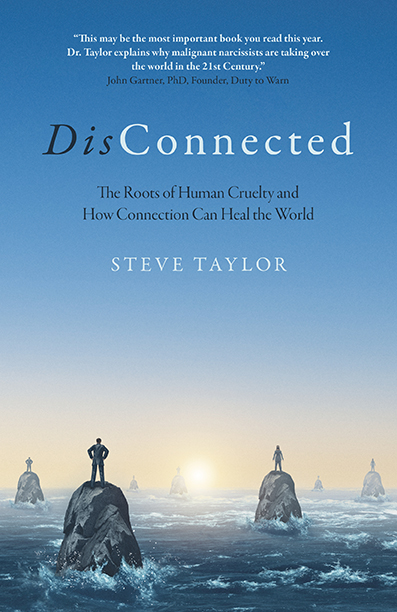In his recent book (“DisConnection”, 2023), Dr. Steve Taylor (Leeds Beckett University, UK), puts forward the deceptively simple thought, that a lack of empathy and connection between peoples, nations, governments and individuals, is what is facilitating abusive tyrants at every level.

Nigel Pocock
This is driven by a relative lack of democracy, equality, and most fundamentally, and controversially, spirituality. What I have attempted here, is not to outline Taylor’s book, but to discuss his ideas.
The reader will find that this book is very well-written, user- friendly, and accessible. Whether the ideas are achievable, we will leave it to the reader to decide, this being the first of four articles.
The present reviewer is a Christian at the Openness Theism and Process Theology interface, and this will no doubt colour his perspective and conclusions, hopefully fruitfully. However, there is much in common with Taylor’s approach.
Taylor’s ‘panpsychism’ (subscribing a primitive form of mentality to everything living at the level of physics, while arguing that human sentience and experience is at a higher, more complex level) is not too far removed from Open Theism and Process thought (which that God is in time, and is open to the future).
Whether all of the science behind Neo-Darwinism (Darwin plus genetics and epigenetics) should, in itself, be rejected (as Taylor asserts) is a matter of dispute.
However, the materialism and ‘physicalism’ of neo-Darwinism is not scientific, but a ‘value’ judgment, and should be rejected. But, as Christian ‘openness’ writers, such as John Haught have noted (“God after Darwin”), evolution, far from being a thoroughly ‘mindless’ process (as per Dawkins, Gould, Dennett and others) is quite the opposite.
 It is full of the potential to be creative, full of novelty and newness, full of positive adaptation, and hope. It is also a process of connection, in which, far from being nasty and brutish, was (and is) also full of compassion, as Penny Spikins has shown in her book, “How compassion made us human” (2015).
It is full of the potential to be creative, full of novelty and newness, full of positive adaptation, and hope. It is also a process of connection, in which, far from being nasty and brutish, was (and is) also full of compassion, as Penny Spikins has shown in her book, “How compassion made us human” (2015).
Exhumed skeletons of prehistoric people show that the disabled were cared for, and lived far beyond expectations. For strategic reasons, people decided to suppress the truth about trusting each other.
The crux of Taylor’s book lies in its clever title: “DisConnection”. Disconnection is a universal curse, and has been for centuries of human history. The opposite is connection, and the more this can be encouraged, the better.
John Caccioppo (“Loneliness”) shows that oxytocin (the trust hormone) is released in the simplest of physical contact, such as stroking someone’s arm. Where a relationship is built on oxytocin-fuelled bonding, the long-term foundation is fragile (the exception is breast-feeding).
 Maintaining sexual distance therefore helps to make for stability, not a ‘trial’ or ‘open’marriage or sexuality, as it is based on more practical, but possibly rather less ‘exciting’ things, such as common interests.
Maintaining sexual distance therefore helps to make for stability, not a ‘trial’ or ‘open’marriage or sexuality, as it is based on more practical, but possibly rather less ‘exciting’ things, such as common interests.
Controversially, it is currently popular to assert that that all family styles are somehow equal, but scientifically and empirically marriage is the best option for both partners, and for children.
All the scientific evidence, in terms of healthy, longevity, education, and more, lie in a loving, unselfish marriage, not in so-called trial marriage (actually an indicator of shorter marriage). ‘Me first’ does not encourage unselfishness and a decentred ego. Following Taylor, genuine connection is based on love. But we do need to define this ‘love’. Thomas Jay Oord (“Defining love”, 2010) has defined love (Greek: agape) as meaning ‘seeking the best for the other(s)’, and this seems right. Some authorities have attempted to assert that all human behaviour is ultimately selfish (cf., Elliott & Sober, “Unto others”), but this seems too extreme.
 Of course, love has its rewards for the giver, but not all love is so motivated, and indeed, this may not in fact be wrong if it does have a ‘feel good’ quality.
Of course, love has its rewards for the giver, but not all love is so motivated, and indeed, this may not in fact be wrong if it does have a ‘feel good’ quality.
What appears to be unique to Taylor’s book is the overwhelming emphasis he gives to his central theme. Much else has appeared in previous research (cf., Ervin Staub, Roy Baumeister, and others), but not with this kind of over-arching explanatory power.
In this, Taylor is surely right that the answer lies in connection and empathy. Narcissists tyrants are to the destruction of us all, including the tyrants’ own supposed beneficiaries.
(Photos: Pixabay)












.jpg)












